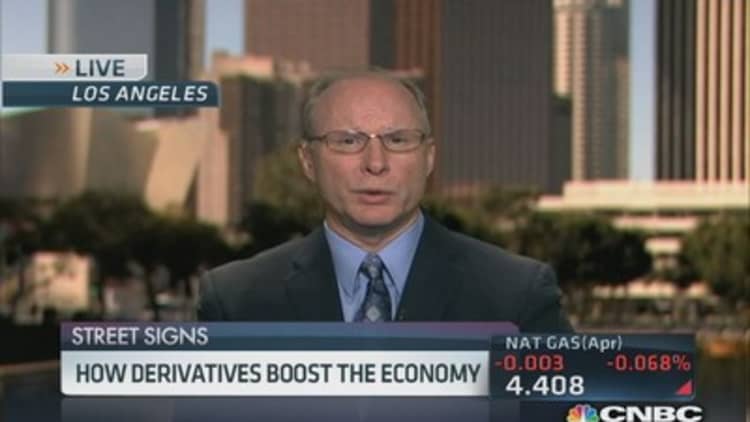The world's biggest banks have agreed to tear up the rule book on derivatives to make it easier to resolve a future failing institution like Lehman Brothers.
People familiar with the matter said 18 bank "dealers", ranging from Credit Suisse to Goldman Sachs, have agreed to give up the right to pull the plug on derivatives contracts with a crisis-stricken institution.
Read MoreProfit at Goldmanless easy to find
Several months of complex talks involved regulators and asset managers but were led by dealers under the umbrella of the International Swaps and Derivatives Association.
US regulators, who have previously condemned the industry's crisis planning as inadequate, had demanded banks come up with a plan to stop their counterparties terminating derivatives contracts in the event of a crisis. The banks portrayed the success of the talks as a rare positive example of industry collaboration.
More from the Financial Times:
China's GDP at PPP overtakes US
Pension fund slashes Pimco investment
Geithnerdefends US action in AIG bailout
Isda is due to announce the agreement to change its "protocols," which govern the $700tn market, in the next few days. They will take effect from January 1, 2015.
According to a report from the US Government Accountability Office, 80 per cent of Lehman's derivatives counterparties closed out their deals with the bank within five weeks of its bankruptcy filing.
Read MoreWilburRoss: Why Draghi is right
That, in theory, helped the companies mitigate their counterparty risk with the failed bank but it also meant that Lehman's estate had to spend years in court trying to claw back collateral from its partners.
"One of the problems with Lehman was when there was a failure of one subsidiary clients of derivatives trades took funding away and took business away, adding to market instability," said one bank negotiator.
This also made it harder to find buyers for the rump of Lehman. The current thinking among regulators is that the core of a failing institution should be preserved. Although shareholders would be likely to be wiped out, the operating company would be recapitalised or sold to mitigate the shock to the broader financial system.
"You have the financial sector absorb the losses but you have the company stay in business," said another industry negotiator. "Assuming it gets signed up, it's a very important step in ending 'too big to fail.'"
The concept of "too big to fail" has become hugely controversial since the financial crisis when AIG was bailed out by the US government because of fear of the consequences of its failure.

Regulators have been struggling to come up with a viable system to avoid a repeat of the expensive bailout of AIG or the damaging failure of Lehman. The Dodd-Frank financial reforms in the US and parallel reforms in Europe instituted new procedures to "resolve" a failing institution but many believed these were unworkable without changes to derivatives contracts.
The vast majority of derivatives contracts will be covered by the agreement to change the Isda protocols, according to banks, but there are several elements yet to settle.
One of the most important is that large institutional investors such as BlackRock would not be covered by the changes, particularly if they are cross-border counterparties.
Regulators are working to compel asset managers and hedge funds to accept the new protocols. Some of them argue they cannot voluntarily give up the right to cut off business with a failing bank because of a fiduciary duty to protect their investors' interests.
Read MoreWorld Bank CFO declines bonus to quell staff revolt
Another element that is not finalised is how the system would work in the event of a US company going through bankruptcy in the courts rather than the new resolution regime. Participants in the Isda talks said the industry had come to agreement and "prewired" the way this would work but it required regulation to make it effective.
The overhaul has drawn criticism from some who think that regulators may have made a mistake in asking the industry to update the derivatives documents voluntarily. Some market participants had suggested that regulators introduce incentives, such as preferential capital margin treatment, to speed negotiations.
—Additional reporting by Gina Chon in Washington

